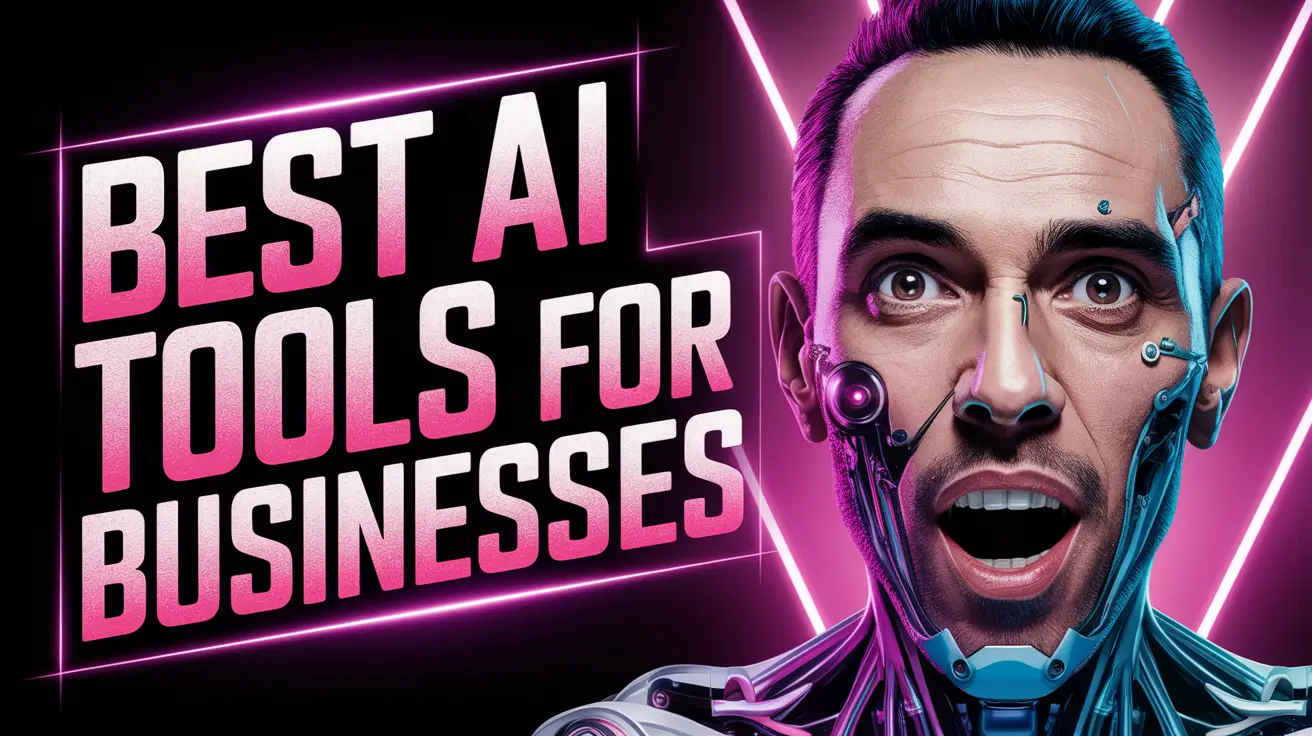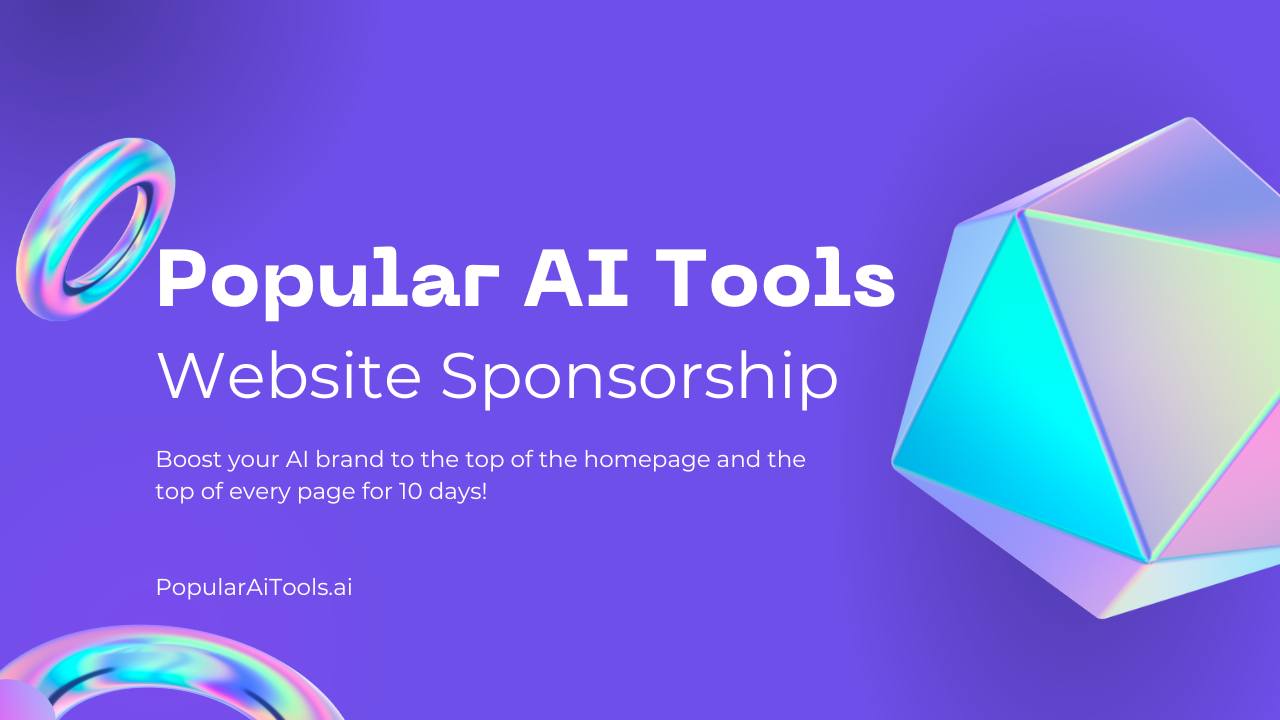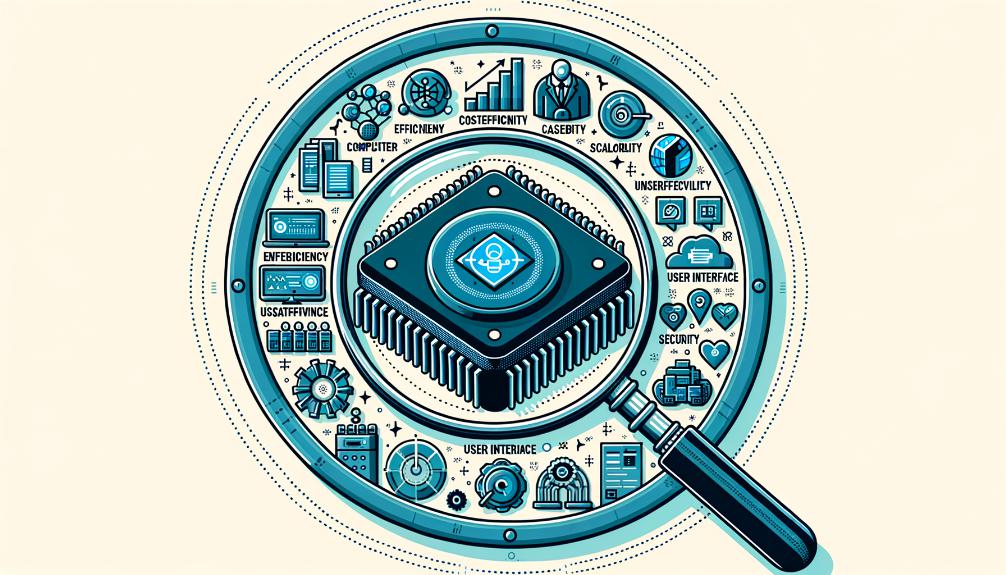10 Best AI Tools for Businesses in 2025: Revolutionize Your Operations
AI adoption in business has reached a critical inflection point in 2025, with transformative impact across operations and productivity. The market shows unprecedented growth, expanding at a CAGR of 36.6% through 2030, with implementation varying significantly by business size and sector.
Top AI Tools For Businesses
Implementation Statistics
Current Adoption
- 72% of organizations use AI in at least one business function
- 83% of companies prioritize AI in business strategy
- 77% actively use or explore AI solutions
- 35% leverage AI to address labor shortages
Usage Patterns
- 33% implement limited AI use cases
- 25% achieve widespread AI adoption
- 21% scale promising proof of concepts
- 14% test initial implementations
Business Impact
Performance Metrics
- 270% growth in business AI utilization since 2019
- 156% improvement in operational efficiency
- 41% reduction in manual tasks
- 68% adoption rate among large enterprises
Implementation Strategy
- 40% purchase external solutions
- 40% develop in-house capabilities
- 20% utilize outsourced services
This analysis focuses on measurable outcomes and practical implementation strategies for businesses seeking AI-powered solutions.
But the decision to integrate these tools into your operations involves more than just understanding what they do; it’s about recognizing how they align with your business goals and challenges. Let’s explore what makes these tools indispensable for the future-oriented business, and how they could be the key to unlocking unprecedented efficiency and innovation in your operations.

Key Takeaways
- AI tools such as Decktopus and Magic Slides can streamline the presentation creation process and offer customization options, making it more efficient for businesses.
- Cody, an AI-powered assistant, can enhance business efficiency and productivity by providing tailored support in various tasks and languages, with 24/7 operational capability.
- Mixo enables quick website creation without the need for coding or design skills, thanks to its AI-powered content generation feature and affordable pricing options.
- Namelix is a useful AI tool for naming and branding businesses, as it generates creative and brandable business names with customizable filters and continuous improvement based on user feedback.

AI Tools Related Articles – Entrepreneurship and Productivity
Decktopus – The Best AI Tool For Business in 2024?

For businesses aiming to transform their presentation game in 2024, Decktopus emerges as the go-to AI tool, offering unmatched customization and efficiency. As someone constantly seeking ways to enhance communication, I’ve found Decktopus invaluable. It’s not just another presentation tool; it’s an AI-powered generator that revolutionizes how presentations are created.
With its ability to produce stunning, professional slides within seconds, I’ve said goodbye to mundane templates. The process is simple: I type in my presentation title, and Decktopus takes care of the rest, suggesting images, icons, and even creating tailored slide notes. It’s been a game-changer, saving me time and elevating my presentations beyond the ordinary.
Start Your Free Trial With Decktopus Here
Best For: Individuals and businesses looking to streamline their presentation creation process with AI-powered customization and efficiency.
Pros:
- AI-powered content generation streamlines the creation process, saving time and effort.
- Offers a wide range of multimedia embedding options, including live websites and videos, enhancing the presentation’s interactivity.
- Real-time feedback collection feature enables immediate audience engagement and data gathering.
Cons:
- May require a learning curve for users unfamiliar with AI tools or those with specific customization needs.

Cody – AI Tool Reviews, Pricing and Alternatives 2024
I find Cody’s 24/7 operational capability and instant access to vast information indispensable for businesses aiming for round-the-clock productivity. Its ability to be trained on my specific business needs, adapting to our unique dynamics and requirements, is a game-changer. Cody’s knack for providing instant, accurate answers, and its source verification feature, adds layers of trust and reliability.
Furthermore, its multilingual support breaks down language barriers, enabling global reach with relative ease. The tool’s versatility in handling creative tasks, troubleshooting, and brainstorming, alongside routine tasks like email drafting and document translation, elevates its utility. Considering its broad application across different scales and sectors, Cody stands as a robust, AI-powered business assistant, tailored to modern business demands.
Best For: Businesses looking for a versatile AI-powered assistant to increase efficiency and productivity across various tasks and languages.
Pros:
- Cody’s 24/7 operational capability ensures constant productivity and access to information.
- The ability to be specifically trained on a business’s unique needs allows for tailored support and adaptability.
- Multilingual support and source verification feature enhance trust and global applicability.
Cons:
- Initial setup and training on specific business processes may require time and resources.

AI Related Sections You Might Like:
Magic Slides – AI Tool Reviews, Pricing and Alternatives 2024

MagicSlides revolutionizes presentation creation, making it the go-to AI tool for anyone who’s ever faced the daunting task of assembling slides from scratch. I’ve found that it incredibly simplifies the process, automating the grunt work of slide generation. By integrating seamlessly with Google Slides, it lets me effortlessly turn my ideas into professional-looking presentations.
Get Started With Magic Slides Here
I just install MagicSlides, input my presentation text, and hit generate. Like magic, it crafts content-rich slides, pulling from a diverse array of themes and layouts. It’s not just about saving time; it’s about enhancing quality.

Related AI Tools Articles – Specialized Tools and Services
- Best Gelato Print on Demand Alternatives
- Print on Demand Midjourney Course
- WriteHuman: The AI Humanizer
- AI Tools Hidden Images Optical Illusion
- Best AI Website Builders
- 11 Best AI Voice Generators & AI Voiceovers
- Print on Demand Low Competition Keywords
Whether I’m prepping for a business pitch or an academic lecture, MagicSlides has got me covered. And with its easy availability on the Google Workspace Marketplace, it’s been a game-changer for my work.
Best For: Individuals and organizations looking to streamline their presentation creation process with AI-driven efficiency and customization.
Pros:
- AI-Powered Slide Generation automates the slide creation process, significantly reducing the time and effort involved.
- Seamless Integration with Google Slides enhances user experience by allowing easy access and use within a familiar platform.
- Offers a wide range of themes and layouts, enabling users to customize presentations to suit their specific needs and preferences.
Cons:
- Dependence on AI might limit creative control and customization in some aspects of presentation design.
AI Related Sections You Might Like

AI Related Sections You Might Like
Mixo – AI Tool Reviews, Pricing and Alternatives 2024
Entrepreneurs who dread the technical side of launching a website will find Mixo’s AI-powered solution a game-changer in 2024. It’s not just about creating a site; it’s about birthing a fully functional online presence without touching a line of code or fretting over design details.
I’m particularly impressed by how Mixo streamlines the entire process. From crafting compelling content based on a brief description to managing subscribers and collecting feedback, it’s all done with a few clicks. What’s more, the stunning landing pages come with all the necessary tools integrated.
For someone like me, who values time and wants to focus on the business rather than the technicalities, Mixo offers a breath of fresh air. Its free pricing model and additional features, accessible through their official pricing page, make it an affordable solution for businesses of any size. This tool not only eliminates technical hurdles but also allows entrepreneurs to concentrate on refining their ideas and connecting with their audience.
Best For: Entrepreneurs and businesses looking to launch websites quickly without the need for technical expertise.
Pros:
- Streamlines the website creation process, making it accessible to users with no coding or design skills.
- AI-powered content generation saves time and ensures relevant, engaging website content.
- Free pricing model with additional affordable options caters to businesses of all sizes.
Cons:
- May not offer the same level of customization as traditional website development.

AI Tools Related Articles – Marketing and Content Creation
- Best AI Tools for Digital Marketing and AI Ad Creation
- The 10 AI Tools Reinventing Copywriting
- Best AI Marketing Tools 2023
- Top 10 AI SEO Tools: Ultimate Guide Revolutionizing SEO
Namelix – AI Tool Reviews, Pricing and Alternatives 2024

For startups aiming to make a splash, Namelix’s AI-powered business name generator is the go-to tool, turning the daunting task of naming into a breeze. It’s not just about creating a name; it’s about making that vital first impression count. Namelix excels in delivering short, catchy, and brandable names that help a business stand out. It’s perfect for startups, but also for small to medium businesses and those looking to rebrand.
The beauty of Namelix lies in its state-of-the-art language model. It learns from my preferences, making its suggestions more accurate the more I use it. With customizable filters for name length, keywords, and even domain extensions, it offers precisely what I need. Plus, it’s affordable, making it accessible for businesses on a tight budget.
Best For: Startups, small to medium businesses, and individuals looking for unique, memorable, and brandable names for their ventures.
Pros:
- Utilizes advanced AI to generate creative and brandable business names.
- Offers customizable filters for personalized name suggestions.
- Continuously improves recommendations based on user feedback and preferences.
Cons:
- May generate names that are already taken or trademarked.

AI Related Sections You Might Like:
IdeaBuddy – Your Ultimate Idea Management and Business Planning Tool
As someone navigating the complexities of starting a business, IdeaBuddy stands out as the ultimate tool for managing ideas and planning, thanks to its AI-powered planning capabilities. It’s designed as a digital ally for entrepreneurs, simplifying the planning process and guiding users from conception to execution. I’ve found its ability to shape and visualize business ideas invaluable, not to mention the ease of collaborating with colleagues and mentors.
The platform offers a suite of features like the Idea Plan, which allows me to structure my business concept on a single page, and customizable templates tailored for various industries. Its mobile accessibility means I can work on my plans anytime, anywhere, ensuring I’m always ready to adapt and evolve.
Best For: Entrepreneurs and small business owners looking for a comprehensive tool to assist in the ideation and business planning process.
Pros:
- Simplifies the business planning process with AI-powered tools and guidance.
- Enhances collaboration by allowing colleagues and mentors to contribute easily.
- Offers mobile accessibility, ensuring that users can work on their plans anytime and anywhere.
Cons:
- May require a learning curve for users unfamiliar with digital planning tools.

Simplified: An Easy to Use All-In-One App For Modern Marketing Teams

Why look further when Simplified offers an all-in-one marketing solution that’s perfect for teams craving efficiency and creativity? It’s my go-to platform, empowering me to unleash the full potential of AI in content creation. With Simplified, I’ve joined over 2.5 million users in transforming how we craft content. From one-click design tools to a plethora of free photos and templates, it’s streamlined my workflow, saving both time and money.
I’ve effortlessly removed image backgrounds, resized designs for various platforms, and curated unlimited brand kits. Plus, its AI Writer revolutionizes copywriting, generating SEO-friendly, plagiarism-free content in seconds. Simplified isn’t just a tool; it’s a game-changer for modern marketing, making complex tasks simple and fostering unparalleled creativity and collaboration within teams.
Best For: Marketing teams and content creators looking for an efficient, AI-powered all-in-one tool to streamline their content creation and social media management.
Pros:
- AI-driven features for quick and innovative content creation, including text, images, and videos.
- Comprehensive social media management tools allow for easy planning, scheduling, and analyzing of posts.
- User-friendly interface with access to millions of free resources and one-click design tools.
Cons:
- Over-reliance on AI may limit creativity or result in less personalized content.

Your AI Powerhouse for All Advertising Needs
AdCreative.ai revolutionizes advertising by generating high-conversion creatives, making it the top choice for businesses aiming to outperform competitors in 2024. It’s not just about volume; with millions of creatives generated daily, its AI-driven approach delivers up to 14x higher conversion rates.
I’m impressed by the breadth of features, from generating ad creatives, texts, and headlines to complete ad packages. With options for video ads and analyzing competitors, it’s a comprehensive tool. The inclusion of unlimited premium stock assets and a model trained for up-to-date, conversion-focused creatives seals the deal for me.
Their flexible pricing, including a free trial and discounts, makes it accessible. It’s clear why over 1.5 million advertisers choose AdCreative.ai.
Best For: Businesses and advertisers seeking to leverage AI for high-conversion ad creatives and outmatch their competition.
Pros:
- High conversion rates with up to 14x improvement using data-backed creatives.
- Comprehensive suite of features for generating ads, texts, headlines, and complete ad packages.
- Flexible pricing with free trials, discounts, and custom plans available.
Cons:
- May require a learning curve to fully utilize all features and integrations.
AI Related Sections You Might Like
Simplified: All-in-One Marketing Tool for Creators & Businesses

For business owners and marketing teams seeking an efficient way to juggle multiple content creation tasks, Simplified’s all-in-one platform emerges as the go-to solution in 2024. It’s a game-changer, combining graphic design, video editing, AI copywriting, and social media management, all under one roof.
I’ve found it acts like a full-scale marketing department, streamlining the design process and boosting creativity. What stands out is its time-saving tools and easy collaboration features, allowing for seamless teamwork with real-time comments and unlimited workspaces.
I’ve seen it tackle the common challenges of design complexity, content creation time, and collaboration issues head-on. It’s been a lifesaver for me, reducing stress and enhancing my creativity, making it an ideal tool not just for marketing teams but also for business owners and content creators looking for an efficient, all-in-one marketing solution.
Best For: Marketing teams, business owners, and content creators seeking an efficient, all-in-one platform for content creation.
Pros:
- Integrates graphic design, video editing, AI copywriting, and social media management into a single platform.
- Features time-saving tools and promotes easy collaboration with real-time comments and unlimited workspaces.
- Adapts to various marketing needs with AI-driven art creation and technological innovation.
Cons:
- May require a learning curve for users unfamiliar with integrated marketing platforms.

AdCreative – Best AI Tools for Business in 2024
I’ve discovered that AdCreative.ai’s unprecedented ability to skyrocket conversion rates makes it the top pick for digital marketers aiming to dominate in 2024. This AI-powered platform generates tailor-made ad creatives and social media posts in seconds, offering a significant edge in the digital marketing realm. What sets AdCreative.ai apart is its machine learning model that continuously adapts, ensuring the creatives are always optimized for conversion.
Start Your Free Trial Here
AI Related Sections You Might Like
Moreover, the platform’s integration with major platforms like Google and Facebook simplifies the marketing process, making it a comprehensive solution for modern businesses. With a reported 14x increase in conversion rates and a substantial improvement in Click-Through Rate (CTR) for over 95% of users, it’s clear why AdCreative.ai stands out among the best AI tools for business in 2024.
Best For: Digital marketers and businesses looking to significantly boost their digital ad conversion rates and streamline their marketing efforts with AI-powered creatives.
Pros:
- Offers up to 14x higher conversion rates, providing a substantial competitive advantage in digital marketing.
- Integrates seamlessly with major platforms like Google and Facebook, simplifying the ad creation and distribution process.
- Provides unlimited free stock images, text generator AI, and creative insights, enhancing the quality and effectiveness of ad creatives.
Cons:
- The platform’s advanced features may require a learning curve for users new to AI-driven tools.
Factors to Consider When Choosing AI Tools for Business

Choosing the right AI tools for your business in 2024 requires careful consideration of several key factors.
I’ll explore how scalability potential, integration capabilities, cost efficiency, user experience, and innovation & adaptability can significantly impact your decision-making process.
Each of these points plays a crucial role in ensuring that the AI solution you select aligns with your business goals and operational needs.
Scalability Potential
When selecting AI tools for your business, it’s crucial to consider their scalability potential to ensure they can handle growing demands without faltering. I look for tools that can smoothly manage increasing workloads and data volumes without sacrificing performance or incurring hefty additional costs.
It’s essential to find AI tools that are flexible and adaptable, capable of adjusting to changing business needs and technological shifts. Integration capabilities also play a pivotal role, as the tools must seamlessly fit into my existing systems, allowing for effortless scalability.
I assess their performance at scale, ensuring they remain efficient and reliable as operations expand. Lastly, I prioritize finding cost-effective scaling options, aiming to grow my business’s AI capabilities without breaking the bank.
Integration Capabilities
To unlock the full potential of AI tools in business, it’s crucial to zero in on their integration capabilities, ensuring they mesh well with existing systems and software. The way an AI tool can blend with other business applications and platforms plays a pivotal role in its effectiveness and efficiency.
I’ve come to understand that evaluating these capabilities is key to ensuring a tool can operate within our current technological setup without hiccups. AI tools that excel in integration facilitate smoother workflows, enable easier data sharing, and improve communication across various systems.
It’s clear to me that a deep dive into an AI tool’s integration capabilities is essential for gauging how it will impact our business operations and tech environment.
AI Related Sections You Might Like:
Cost Efficiency
Having explored integration capabilities, I’ll now examine the cost efficiency of AI tools to ensure they fit within our financial framework and deliver real value.
It’s crucial to assess each tool’s cost-effectiveness, ensuring it aligns with our budget while offering true value for money. I’ll delve into the potential return on investment, determining long-term benefits and cost savings.
Scalability is another key factor; the tool must grow with our business without breaking the bank.
I also can’t overlook ongoing maintenance and support costs, which significantly impact overall cost efficiency.
Lastly, I’ll factor in the costs associated with integrating these AI tools into our existing systems, ensuring seamless operation and cost efficiency.
User Experience
In evaluating AI tools for business, it’s essential to consider user experience, which encompasses ease of use, efficiency, and overall satisfaction. This involves looking at how intuitive and accessible the tool is for users.
A positive experience can boost productivity, while a negative one might deter use. The interface, navigation, and how responsive the tool is are vital. It’s not just about how it looks but whether it meets users’ needs quickly and accurately. If it’s cumbersome or slow, it doesn’t matter how powerful it is, people won’t use it.
Innovation & Adaptability
As businesses evolve, selecting AI tools that prioritize innovation and adaptability becomes crucial to staying ahead in a competitive landscape. These tools need to grow with changing business needs and technological advancements.
Features like AI-powered content generation, real-time feedback collection, and customizable domain connections can dramatically impact growth. It’s essential to choose AI tools versatile enough for various scenarios, from sales to education.
Tools like Cody, which can be trained on specific operations, and MagicSlides, integrating seamlessly with Google Slides, highlight the importance of adaptability. The ability to eliminate design skill requirements, automate content generation, and save time underscores the potential of AI tools to drive innovation and adapt to business challenges, ensuring long-term success.
AI Related Sections You Might Like:
Data Security Measures
When choosing AI tools for business, prioritizing data security measures is crucial to protect sensitive information. I look for AI tools that offer robust data encryption, ensuring that my company’s sensitive information is safeguarded against unauthorized access.
It’s essential that these tools also provide access control features, allowing me to restrict data access solely to authorized personnel. I always consider whether these tools adhere to industry-specific data security and privacy compliance standards.
Regular security updates are a must to combat emerging threats and vulnerabilities effectively. Lastly, I evaluate the AI tools’ data handling protocols. Understanding how these tools manage data storage, handling, and transmission helps me maintain the highest level of data security in my operations.
Support & Training
After ensuring data security measures are in place for AI tools, it’s crucial to evaluate the support and training options they offer.
I look for AI tools with comprehensive support and user-friendly systems. This includes easy-to-navigate tutorials, FAQs, and a responsive customer support team ready to assist.
Training materials are also vital. I assess if there are webinars, thorough documentation, and video tutorials available for smooth onboarding and ongoing skill development. Furthermore, access to community forums or user groups is essential for peer support and knowledge sharing.
Lastly, I consider whether the AI tool provides customized training options. These should be tailored to my business needs and my team’s skill levels, ensuring everyone can fully leverage the tool’s capabilities.
Frequently Asked Questions
How Do These AI Tools Integrate With Existing Legacy Systems Within a Business, Ensuring a Smooth Transition Without Disrupting Current Operations?
I’ve been looking into how AI tools can mesh with old systems at work, aiming for a seamless switch without messing up what we’ve got going.
It seems the key’s in choosing AI solutions that offer flexible integration capabilities, kinda like plug-and-play, but smarter. They’ve got to be adaptable and understand the existing tech landscape.
I’m learning it’s all about ensuring they can communicate effectively with the old guard, so nothing falls through the cracks.
What Measures Are in Place to Ensure Data Security and Privacy When Using These AI Tools, Especially in Sectors With Stringent Regulatory Requirements?
I’m really focused on how to keep my data safe and private when I’m using these AI tools.
It’s especially tricky in areas where the rules are really strict.
To tackle this, I’m looking into encryption methods, access controls, and regular audits.
Plus, I’m keeping an eye out for compliance with laws like GDPR.
It’s all about finding tools that don’t just play well with my tech but also protect my information.
How Do These AI Tools Address the Issue of Bias in AI Algorithms, Ensuring That the Decisions Made or Suggestions Provided Are FAIr and Unbiased?
I’m curious about how these AI tools tackle the problem of algorithmic bias to make sure their decisions or suggestions are fair.
It’s crucial they’re designed with mechanisms that identify and mitigate bias, like diverse training data and regular audits.
Understanding their approach to this issue is vital for any business aiming to implement AI responsibly.
It’s about trust and ensuring that the technology works equitably for everyone involved.
Are There Any Industry-Specific Versions of These AI Tools AvAIlable, TAIlored to Unique Needs and Challenges of Sectors Such as Healthcare, Finance, or Manufacturing?
Yes, there are industry-specific versions of these AI tools designed to cater to the unique needs and challenges of sectors like healthcare, finance, and manufacturing.
These specialized tools are tailored to understand the intricacies of each field, ensuring more accurate and relevant outcomes.
For example, healthcare AI tools can process patient data to predict outcomes, while finance AI tools focus on risk assessment and fraud detection.
This customization enhances efficiency and decision-making across industries.
How Do Businesses Measure the ROI After Implementing These AI Tools, and What Metrics or KPIs Are Commonly Used to Gauge Their Success and Impact on Business Operations?
To measure the ROI after implementing AI tools, I’d look at specific metrics or KPIs that reflect their impact on my business operations.
This could include increased efficiency, cost savings, improved customer satisfaction, or revenue growth.
I’d also consider the reduction in errors or the speed of decision-making processes.
Essentially, it’s about identifying the tangible benefits these tools bring to my business and quantifying their value in measurable terms.
Conclusion
After diving into the world of AI tools for businesses, I’ve realized how transformative they can be. From Decktopus to Simplified, each tool offers unique solutions for streamlining operations and boosting creativity.
Whether you’re crafting presentations with Magic Slides or devising marketing strategies, there’s something for everyone. Choosing the right one depends on your specific needs and goals.
In 2024, these AI tools aren’t just optional; they’re essential for staying competitive and innovative.

